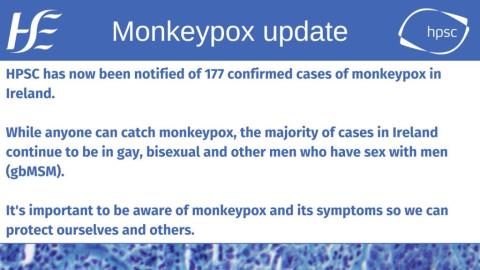
HPSC has now been notified of 177 confirmed cases of monkeypox in Ireland and have published the latest report on confirmed cases. Read the latest update on monkeypox in Ireland here: https://www.hpsc.ie/a-z/zoonotic/monkeypox/title-22106-en.html
For the latest information on confirmed cases of monkeypox in Ireland see Epidemiology of Monkeypox in Ireland Report.
For each case notified, Public Health follows up all those who had close contact with the case while they were infectious. Public health risk assessments are undertaken, and those who were in contact with the cases are advised on what to do in the event that they become ill, and are offered vaccination if appropriate.
The cases in Ireland are part of an ongoing multi-country outbreak of monkeypox in Europe, the Americas and many other regions worldwide (https://www.cdc.gov/poxvirus/monkeypox/response/2022/world-map.html, https://monkeypoxreport.ecdc.europa.eu/). The vast majority of these cases do not have a travel link to a country where monkeypox is endemic. Many countries have reported that the cases are predominantly, but not exclusively, in men who self-identify as gay, bisexual or other men who have sex with men (gbMSM). The WHO has determined that this multi-country outbreak of monkeypox constitutes a Public Health Emergency of International Concern. This declaration comes with recommendations for countries with cases of monkeypox, like Ireland, to strengthen their public health and clinical responses to stop transmission and emphasises the importance of engagement with affected communities (https://www.who.int/director-general/speeches/detail/who-director-general-s-statement-on-the-press-conference-following-IHR-emergency-committee-regarding-the-multi--country-outbreak-of-monkeypox--23-july-2022, https://www.who.int/news/item/23-07-2022-second-meeting-of-the-international-health-regulations-(2005)-(ihr)-emergency-committee-regarding-the-multi-country-outbreak-of-monkeypox).
In addition to the multi-country outbreak that is affecting Ireland, there are ongoing monkeypox outbreaks in endemic areas (https://www.who.int/emergencies/disease-outbreak-news/item/2022-DON396).
The HSE has established a Monkeypox Crisis Management Team (CMT) to coordinate the multiagency, multidisciplinary response to the outbreak in Ireland. The HSE continues to actively monitor the evolving international situation. To assist in Ireland’s response, monkeypox has been made a notifiable disease. This means that medical practitioners (and laboratories) are required to notify the local Medical Officer of Health/Director of Public Health of monkeypox cases in Ireland.
About monkeypox
Monkeypox is an uncommon disease that is caused by infection with monkeypox virus. The virus is found in some animal populations in remote parts of Central and West Africa, and in the past has caused occasional limited outbreaks in local communities and travellers. The cases being reported across multiple countries now are unusual because most of the cases do not have a link to travel to these parts of Africa.
There are two main clades (variants) of monkeypox: Clade one (I) (formerly Congo Basin clade) and Clade two (II) (formerly West African clade). Clade II consists of two subclades (IIa and IIb). Clade IIb is the primary group of variants circulating in the 2022 global outbreak.
Monkeypox spreads through close contact, including contact with the skin rash of someone with monkeypox. People who closely interact with someone who is infectious are at greater risk for infection: this includes sexual partners, household members, and healthcare workers. The risk of spread within the community in general, is very low.
Symptoms of monkeypox
Symptoms of monkeypox virus infection include:
- itchy rash (see below),
- fever (>38.50C),
- headache,
- muscle aches,
- backache,
- swollen lymph nodes,
- chills,
- exhaustion.
The rash starts as raised red spots that quickly change into little blisters. It usually develops within 1 to 3 days of the start of the fever or other symptoms, but some people may only have a rash. Sometimes the rash first appears on the face and spreads to the mouth, palms of the hands and soles of the feet. However, following sexual contact, the rash may be found initially in the anogenital areas. Not everyone will experience all the symptoms of monkeypox. Rash in the anogenital area, or complications of the rash such as rectal pain, may be the main symptom. Some people may have only a small number of lesions.
The rash goes through different stages before finally forming scabs which later fall off.
Images of the different stages of the rash can be found on the HPSC website at the following link: www.hpsc.ie/a-z/zoonotic/monkeypox/factsheets
Treating Monkeypox:
Monkeypox infection is usually a self-limiting illness and most people recover within weeks, although it can occasionally cause severe complications including death. In endemic Monkeypox infection, severe illness has been seen in people with very weak immune systems, pregnant women and in very small babies.
There is no medicine that can cure monkeypox. Treatment of monkeypox is mainly supportive. This involves treating any uncomfortable symptoms, such as pain or itch, that occur, keeping the patient warm, comfortable and relaxed, and making sure they get plenty of fluids. This allows the person’s own body defences to fight the infection.
Vaccination: Please see the latest HSE statement on monkeypox vaccination.
Gay, bisexual and men who have sex with men (gbMSM):
Anyone, regardless of their sexuality, can get monkeypox if in close physical contact with a case. However, many of the cases in this multi-country outbreak are in men who self-identify as gay, bisexual or other men who have sex with men (gbMSM).
A community engagement response is underway to create awareness within the gbMSM community about monkeypox and its symptoms, including the development of key messaging that is informative but does not stigmatise. This has been designed by representatives from man2man.ie and MPOWER in collaboration with the HSE and has been recognised as best practice in Europe.
As the virus spreads through close contact, the HSE is advising those who self-identify as gbMSM to be alert to any unusual rashes or vesicular lesions on any part of their (or their partner’s) body, including their genitalia. If they do notice any such changes, they should contact their local STI Clinic or their General Practitioner (GP) for advice.
A list of public STI services is available on the HSE’s Sexual Wellbeing website: https://www.sexualwellbeing.ie/sexual-health/hse-sti-services-in-ireland.html.
Further information on monkeypox infection can be found on the HPSC website: https://www.hpsc.ie/a-z/zoonotic/monkeypox/
HPSC continues to closely monitor the situation and provides relevant updates to the public as appropriate.